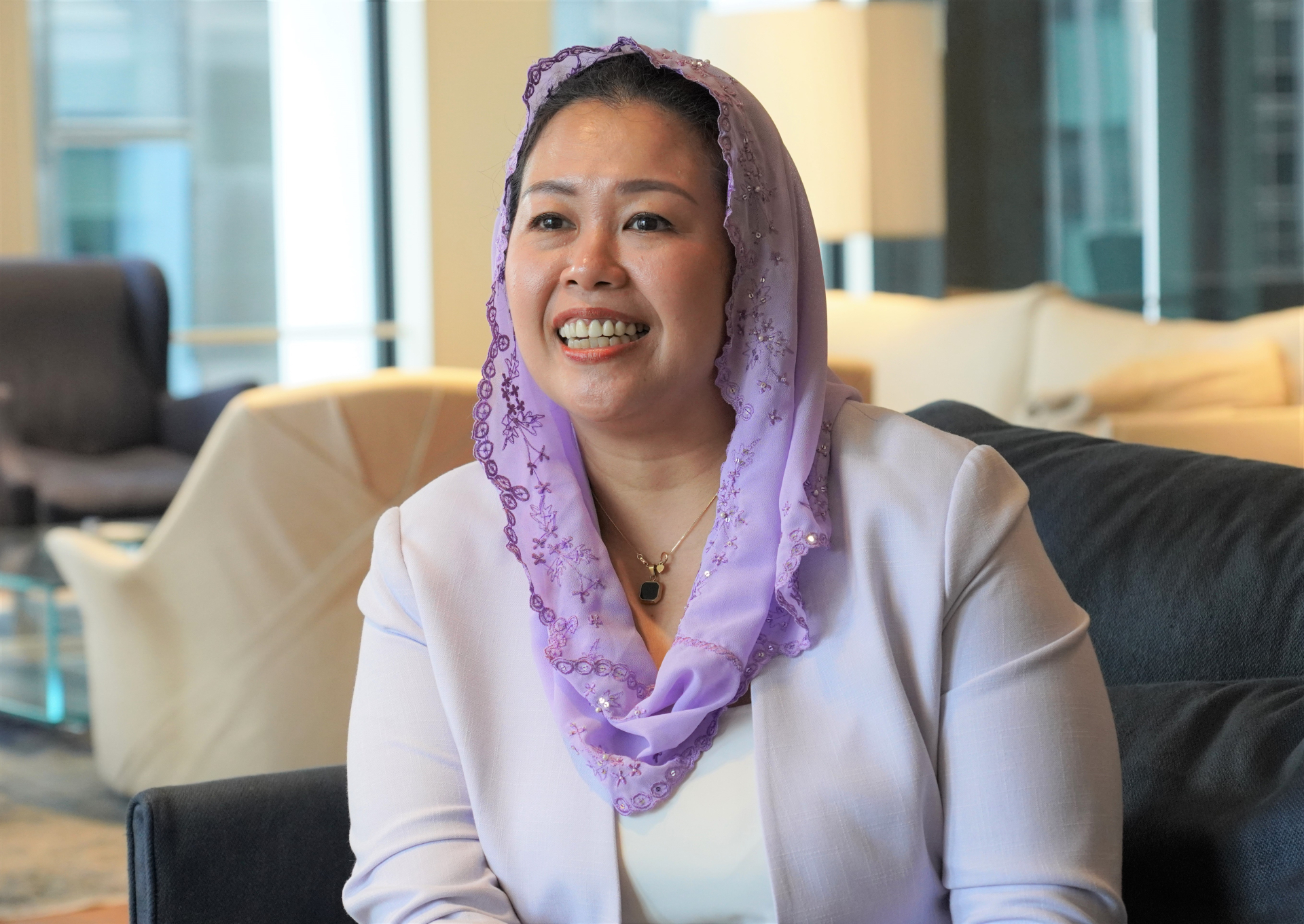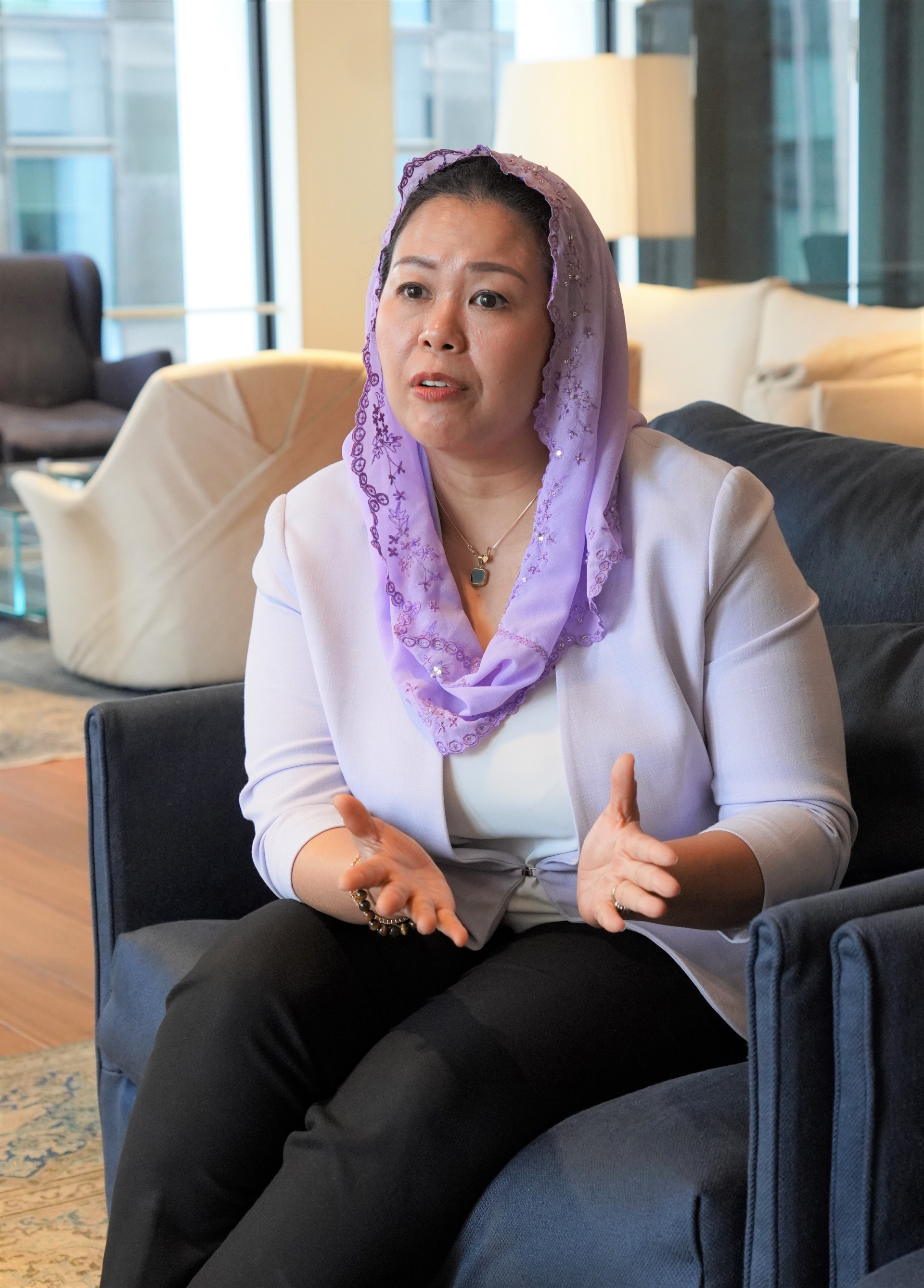This is a very important year. We're at the 50th anniversary of ASEAN-Japan Friendship and Cooperation. So I'd like to ask you about your expectations or your thoughts about Japan and Japan's role looking to Japan-ASEAN and Japan-Indonesia as well. First, how would you assess the state of Japan-ASEAN relations right now?
Ms. Wahid: Japan has always been a stable partner for ASEAN, for ASEAN countries, especially for us, for Indonesians. Japan has always been there, being one of the biggest development partners in Indonesia through the foreign direct aid of Japan to Indonesia. I think the biggest donor to Indonesia is still Japan.
I think that the relationship between the two countries are very, very strong, between the two leaders as well. I think when it comes to economic cooperations, we could be stronger. Japan could play a bigger role. Again, I think Japan has always been a stable partner, but Japan, I think in terms of Indonesia, of course, we've got all this interest from other countries and usually they're quicker in the process, and that's why in a way it's more attractive.
We would like for Japan basically to increase their engagement with Indonesia in particular in the economic sector and go out of the traditional sectors that Japan had invested – in telecommunication, infrastructure – and maybe go to other sectors that Japan has quite an advantage in, and that could provide technology transfer that could benefit the two countries.
One example of that is also in the issues of manpower. There is a shortage of manpower, of course, in Japan with a declining fertility rate. But in Indonesia, we've got an abundance of people. We've got almost 300 million people and most of them, 60% of our population, are young people, in the productive ages. If we could find better ways to cooperate on this, better training the people of Indonesia, young people of Indonesia, to help fill up the opportunities and workforce in Japan, then that could be a win-win situation for both countries, for example.
When it comes to security issues, regional security issues, I think Japan plays a big role, especially given that Japan is a member of the Quad. For us in Indonesia, given our geographical location, we are in the middle between all these Quad countries – Japan, Australia, India. We are on that path of any activities that that could happen, you know, Taiwan Strait, China and all that.
We actually look for Japan also to provide a much clearer stance when it comes to engagement on security issues. I'm talking in particular to the Taiwan Strait, the issues of the Taiwan Strait. If anything happened there, of course, it could disrupt the whole supply chain in the world, and that could just disrupt the whole economy of the world.
We're looking for Japan to be more active, to give a firmer stance, because in the absence of a clear stance from the United States on these issues, we have to look to other players in the region to provide a better understanding of their positions and whether that would create a deterrence for any major player to make a move that could tip the balance of security in the region. And we see Japan as one of those players.
I also want to shift our conversation a little bit to the reason why you're in Japan right now, which is because of the Asian Statespersons’ Forum. This is being held by the Asia and Middle East Program at SPF. This program welcomes leaders from around the region to come to Japan to meet and discuss shared challenges, build connections, and share ideas to provide a forum for people such as yourself to come and discuss these shared issues. Could you tell us a bit about your experience at this event so far?
Ms. Wahid: I just want to say, first of all, how much I appreciate being invited to join the first Asian Statespersons’ Forum of SPF in Tokyo. And it's such a big honor for me to join this program. I found it tremendously helpful in terms of a connection with other leaders in the ASEAN countries, especially the young leaders, and I think this will create a better integration of policies in the future in our respective countries.
For me personally, you know, to be able to reconnect with some of the players and to have, in a way, a closed door of the discussions on sensitive issues I think is extremely, extremely invaluable.
The second thing is that for me personally, also to connect with people who, some of us are children of more established politicians in the past eras. So to connect with all of these other political families as well, I think is just it's wonderful.
And to learn from each other and to learn and to strengthen each other's spirits, basically, because politics is a marathon. You are in there for the long haul. And sometimes when you're down, when you are between jobs physically, it could get your spirit down.
But then meeting people who are in a similar predicament and then making a comeback again later, I think that's also a very good morale boost. And the learning from them, their mistakes, for them to learn from our mistakes and our success stories, I think it's also very beneficial.
You are participating in this forum, of course, because you are a prominent leader in Indonesia. I would be remiss if I didn't ask you about your vision for the future of where that will take you. What do you see as your future path as a leader in Indonesia?
Ms. Wahid: I have always been involved in politics because my family is a political family. My great grandfather founded the largest Muslim organizations in Indonesia with around 100 million grassroots followers that is quite influential in the political landscape, in the socio-political landscape of Indonesia.
My grandfather was a chairman of the organization before he was, he served as a minister in the first cabinet after independence. My father also served as chairman of the organization before he was elected president. The progression for me personally to carry the banner, the political banner, is already laid out. It's not something that I could avoid. Someone has to take up the obligation in a way.
I do feel it is an obligation for me. It is not just a choice, but I do feel that the political bent of the family needs to be upheld, because with it comes a transfer of values that we hope will be instilled in the society. So, of course, our family is known for our belief in the values of tolerance, of protection of minority rights, of equality, of social justice, of protecting the poor.
Through political involvement, we could make sure that governments will adopt this kind of values as a base of their policies in the future.
I think every politician, if the momentum is there and the opportunity is there, will have to say yes to the opportunity to lead the country in any role at all.
For me, I would say that I have to prepare myself if the opportunity comes. But I also still try to contribute to the society in whatever role that I play, even outside of the system. So inside or outside, I will still try to contribute to the country. That's just a calling.
Outro: That was our conversation with Yenny Wahid, director of the Wahid Foundation. We’re hard at work on new episodes of SPF World Views, so don’t forget to subscribe wherever you listen to podcasts. Thanks for joining us, and we’ll see you next time.

